- Home
- Seanan McGuire
Sparrow Hill Road Page 4
Sparrow Hill Road Read online
Page 4
Slowly, like she’s afraid I’m going to disappear, Amy reaches for my arm. I hate being touched by the living when I don’t have a coat on. It itches. Her hand sinks through the place where my skin ought to be, fingers disappearing into what her eyes are telling her is my flesh. Her eyes get even wider, whites showing all the way around her irises. She looks like she’s just seen a ghost. Oh, wait. She has.
“I’m not a dream, but I’m not alive, either,” I say, fighting the urge to yank myself away, to get her out of the space that only I should be occupying. “I died a long time before we met in that field, and I’ve saved your life twice, so it would be nice if you’d pull your hand out of my arm, and maybe let me borrow your coat. I’m cold.”
She opens her mouth like she’s about to ask me how that can even work. Then she clearly reconsiders, maybe remembering the times I’ve touched her in the past—the barren field, the carnival. “Rose,” she whispers, pulling her hand away from me. For a moment, I think she’s going to run. The moment passes, and she shrugs out of her coat, holding it out. Again, she says, “I thought I dreamed you.”
“Well, fortunately, your sanity isn’t that questionable.” Solidity settles over my bones as I take the coat from her, and I’m wonderfully, blessedly breathing again, back among the living for at least a little while. The fabric settles warm and comforting across my shoulders as I slip it on. “I’m as real as you are. Just a little deader.”
“But how . . .”
“That’s a question, and a concept, for someone a lot smarter than me. Dead doesn’t mean getting a free pass on the secrets of the universe. Sorry.” I shrug expansively, sniffing the air as I do. The smell of ashes is still there, and there’s a new scent underneath it, rich and rotting, like a body that’s been left to decay in a sealed-off room. It’s enough to make me choke, and it’s while I’m taking that second, shallower breath that I catch the final note in her personal perfume of catastrophe.
Wormwood. She smells like wormwood and ashes and decay, and that particular combination only ever means one thing in this world—in my world.
Bobby Cross is coming.
“We have to get out of here.” My voice is barely loud enough to qualify as a whisper. I clear my throat, pushing the panic down, and try again: “We have to get out of here, Amy. What are you doing out here, anyway? Why aren’t you safe at home?”
“I can’t go back there!” She swallows a sob that threatens to turn into a wail before burying her face in her hands. “You’re dead. You wouldn’t understand.”
Pretty little teenage girl sitting alone and crying after sundown. I’m not as clueless as she seems to think I am. I’m almost insulted. “Your parents don’t like your boyfriend, do they? They either think you’re too good for him, or they think he’s no good for you, or maybe a little bit of both.”
She raises her head to stare at me again. Apparently, having a clue about what it’s like to be a teenage girl is even more amazing than being dead. “How did you know?”
“I’ve been sixteen for almost as long as you’ve been alive, and my boyfriend’s parents used to feel that way about me,” I reply. “I guess they were right. I went and died on the boy I loved, and that can’t have been good for him.” I stand, grabbing her arm. “Come on. We’re getting out of here.”
“I can’t go back there!”
The wormwood is getting stronger. Bobby’s coming, and maybe it makes me a bad person, but I’m not strong enough for this, not when I didn’t pick the fight, not when I didn’t pick the battleground. I yank Amy to her feet, shouting, “You don’t have to go back, but you have to go somewhere, or you’re going to die! Right here, right now, tonight, and when your death catches you, you’re not going to get a normal afterlife. You’re going to get pain and screaming and something you don’t deserve to suffer through. Now we. Are getting. Out. Of. Here.”
Every time that I have saved her, every time the accidents in her path have called to me, it’s been because of this night. Because one day, she’d be in the path of Bobby Cross—assuming she lived that long, which she wouldn’t have done without me; cause and effect don’t really work very well on the ghostroads—and if I wasn’t there to save her, she’d be burned to ash and memory in his hands. “I don’t understand.”
“Is this boy—”
“Will.”
“Fine, whatever. Is Will worth dying over? Or is he worth growing old with?”
She looks uncertain. The taste of wormwood is getting stronger. I give her one more solid pull, and she stumbles forward a few feet, not quite braced.
“Amy, dying sucks,” I say, as softly as I dare. “Trust me on this one. You don’t want to do it if you have another choice, and right now, you have another choice. You can run.”
I’ve been saving her since she was a little girl, even if it took a while for her to realize it. Her eyes widen briefly, and she nods, her hand seeking mine. I lace our fingers together, and then we’re running, dead girl and endangered girl, running so fast that our feet barely seem to touch the pavement. Half the time I’m pulling her, and half the time she’s pulling me—more than half the time, once we really start moving, because I don’t know our destination and she does. She knows this town, this is her town, and I’m only passing through.
An engine roars somewhere in the dark behind us, and that old dark feeling uncurls in the hollow of my stomach as the taste of wormwood washes everything else away. He’s here. Bobby Cross is close enough to end my world forever. And then, ahead of us, like sweet salvation, I see it. The diner, lights still on, neon sign still glowing. I clasp my fingers tighter around Amy’s, shouting, “This way!” and haul her toward that bright cathedral of the milkshake and the cheeseburger and the ice cream soda.
His car roars one more time in the dark as we hit the diner door, the bell above it jingling too merrily for the situation. Panting, I drop Amy’s hand. “You’re safe here,” I say. “You can’t be on the streets. Not until dawn. Tomorrow, you go see your boyfriend. Tell him you love him. Tell him he’s worth the risk.” Bobby only takes the chaste girls, the ones who’ve never been caught. I didn’t know that when he came after me. I never had the chance to fix things.
“W-what?” Amy stares at me, as baffled as the waitress who’s turning in our direction, trying to figure out why two teenage girls just came running in hellbent for leather at an hour that’s usually seen only by grave-shift workers and drunks looking for one last pause before the serious boozing begins. “You can’t leave me here. Not if there’s someone out there who’s going to hurt me. You can’t—”
“I can, and I have to.” Bobby is still outside, frustrated by the disappearance of his prey. I can feel him, and that means he can feel me. If I step outside this oasis of the road, he’ll know beyond the shadow of a doubt that I’m in range, and he’ll forget all about Amy. Given a choice between us . . . I’m the one who got away. He’ll never choose her over me. “You need to stay inside until the sun comes up. Promise me.”
“Rose, I—”
“Promise me!”
“All right! I promise, I promise!” She looks scared out of her mind. Good. That means she may live to see the morning.
“Don’t let her leave,” I command the waitress, who nods, fear worming through the confusion in her eyes. No one works the night shift in a diner for long without learning that the world is bigger, and bleaker, than they ever dreamed. “Good. Thank you.” And I turn, Amy’s coat still wrapped around me, and step out into the warm Wisconsin night.
Everything is silence, no sign of Bobby Cross or his demon car. I don’t need to see him to know that he’s here. I can taste him in the wind. I can always taste him. Murderer, monster, man who made me. He’s still here.
“Come on, asshole,” I say. “Come on.” I shrug out of Amy’s jacket, feeling warmth and solidity and finally life itself peel away with the fabric, until my ghostly fingers can no longer hold it; it falls to the ground, and my hair is wild around my should
ers, lemon-bleached blonde, and my sweater and long skirt are gone, replaced by a green silk gown meant for a Michigan June, not a Wisconsin night in March. I would be chilly if I were alive. Instead, I’m freezing, because I’m dead. “Come on!”
In the dark, his engine roars. I take a step backward, all too aware of the diner at my back, that sweet sanctuary that has already opened its arms to me once tonight.
I’ve saved Amy twice before. They say the third time’s the charm. I twist around, feet seeking purchase on the sidewalk that I can’t even really feel, and I run. I run.
I run.
It takes the better part of an hour for me to race and dodge and evade Bobby all the way out of the city limits. Amy’s still safe inside the diner. I have to believe that, and I have to believe that he would have turned back if she’d been available to him. That’s the only thing that makes the close calls of the past hour worthwhile.
I dive into a field of new corn, hearing his engine scream frustration on the road behind me, and I keep on diving, driving myself down from the daylight into the comforting dimness of the twilight. The corn is taller here, almost harvest-ready, even though the season has barely begun. It towers above my head, broad leaves blocking out the moon, and everything smells of loam and greenness and safety. I drop to my knees, more tired than I should be. Exhaustion after death just isn’t fair.
The corn rustles to my right, and a woman’s shoe appears in my field of vision, sensible brown walking shoe, the sort of thing worn by farmer’s daughters the whole world over. I lift my head, following it up to a knee-length pleated skirt in plaid wool, a white cotton shirt, and finally, the smiling face of a green-eyed, redheaded woman who I’ve seen twice before, both times in Wisconsin, both times when I was in the process of inexplicably saving Amy.
“There you are,” she says, and smiles, showing straight white teeth with the slightest of overbites. “I was hoping you’d stick around long enough for me to catch up with you.” There’s a slight strangeness in her accent, like another country that’s been worn away to almost nothing. A ghost of a beginning.
A ghost. The other times I’ve seen her, she’s been in the world of the living, and she’d never shown any signs of crossing into the twilight. I stagger to my feet, glad to realize that I’m back in the clothes I chose for myself, rather than in the clothes my death chose for me. “You,” I say. “Who are you?”
“We’re starting with the tough philosophical questions tonight, I see.” She keeps on smiling. “My name is Emma. I . . . look after the girl you’ve been saving. Amy.”
Oh, great. “You’re a guardian angel?”
Her laughter is startled and joyful and tells me what her accent doesn’t. Ireland. My mystery woman comes from Ireland, or did, so long ago that it’s almost washed away from her. “Do I look like a guardian angel?” she asks. “If you asked Amy, I think she’d be like to give you the job, since you’re the one who’s come sweeping in to save her. Three times, even, and that has to be something of a record. No. I’m no guardian angel.”
“What are you, then?” She’s a little bit shorter than I am, even though she looks like an adult woman, and I look, as always, sweet sixteen. “And don’t tell me you’re a friend. Nothing that identifies itself as ‘a friend’ ever really is.”
She sighs. “What I am is Emma. I’m Amy’s family beán sidhe.”
I stop at that, blinking at her. She blinks calmly back at me, waiting. Finally, unsure of how else I should be responding, I say, “Okay, that’s new.”
“Since I’ve been their family beán sidhe for about fifteen generations now, no, it’s not. But I can see where it would be new to you.” She grins again, another flash of those so-white teeth. “I wanted to thank you for what you’ve done for Amy. I’m not allowed to intervene with members of the family, and I would have hated to see her die so far ahead of her time.”
“People have times?”
The words are out before I can really think them through. Emma’s smile dims a little. “Yes,” she says. “People have times. The trouble is, the world doesn’t always stick to the timetable. She’s been in serious danger three times in her life, and you’ve stopped her from getting hurt all three times. I owe you for that.”
I don’t understand any of this. I’m a road ghost. We live in the twilight, and we don’t go any deeper when we have a choice in the matter. Beán sidhe are creatures of the Irish underworld, and my experience with them is minimal, which really means I don’t have any experience with them at all. I’ve been pretty happy keeping it that way. “Why didn’t you step in, if she’s your charge?”
“That’s not what beán sidhe do,” says Emma, and her smile is back, if a little thinner than before. Her teeth still seem too white against the dark, and something about them doesn’t read quite human to me. Not all things in the twilight started out as human beings. “I’m not allowed to interfere like that. If I were, well. Some beán sidhe would keep their families alive at the expense of everyone around them. Others would kill their families off in order to win their freedom. It would get very ugly, very quickly. So we’re not allowed to step in until the people we watch are too far gone to be saved.”
Most of the time, when I interfere, the people I’m trying to rescue wind up dying anyway. Most of the time, but not always. I can’t imagine what it would be like if I could never save anyone, if I had to keep standing by and watching as they died. I shudder, trying to push the thought away. “I’m sorry.”
“I’m used to it.” Emma’s smile softens. “Amy’s the only member of her generation, and when she marries, her children won’t be O’Malleys. Not the way she is. My duty is done when Amy dies . . . but I’ve had to bury a lot of people to get this far, and I’ve wept for every single one of them.”
“What happens to a beán sidhe without a family?”
“Depends on the beán sidhe. Some adopt new families. Some go poltergeist and spend some time breaking things. Others take over diners and learn how to make ice cream sodas.” Emma grins again, and this time there’s nothing inhuman in the expression. “I understand that I make a pretty darn good ice cream soda, if I do say so myself. And in case you were wondering, I count as the living when it comes to giving food to hungry ghosts who have themselves a little credit. Have you ever heard of a place called the Last Dance?”
Everyone’s heard of the Last Dance Diner. It’s a hitcher legend, a place everyone swears exists and no one knows how to reach. “Sure,” I say.
“Great.” Emma offers me her hand. “Come on. I think I owe you dinner.”
I don’t have a coat, but her fingers are solid all the same, and I hold onto them as she leads me out of the corn, out onto the moon-washed surface of the ghostroad. There’s neon gleaming in the distance, and we walk toward it, hand in hand.
Madison, Wisconsin, 2008.
It was a stupid accident. The car—a 1992 Ford—needed maintenance, the brakes were just a little squishier than they should have been, and when Amy needed them most, they weren’t there for her. The other vehicle was a pickup truck with a driver who’d had three beers more than he should have before getting behind the wheel—which is to say, he’d had three beers. Amy didn’t have a chance to scream. It was over in seconds. There was no smell of ashes, no oracle of impending doom; this time, the fourth time, there was nothing I could have done.
Emma’s hand bears down on mine so hard that it hurts. It shouldn’t be possible, not with her solid and me intangible, but the rules don’t apply to her, not here, not now, not with the last member of her family taking her last breath some twenty yards away.
We both know when it ends. Emma closes her eyes, looking so young and so old at the same time, and she starts to sing. I don’t know the words, but the tune is familiar, like something I used to hear when I was dreaming. I pull my hand free and walk over to the car, dropping from daylight down to the twilight when I’m halfway there. Emma is in the twilight, too, still singing, still apparently solid. Emm
a, and someone else.
Amy stands beside the wreckage of her car, expression one of utter bewilderment. Her hair, light when she was a little girl, darkening as she became an adult woman, is light again; she’s lived a lot longer than I did. She looks up at the sound of my footsteps, and her eyes widen, making her look like the teenage girl who ran with me through the Wisconsin night. I stop, and smile.
“Hello, Amy,” I say.
Her smile is like streetlights coming on in the middle of a winter night. The years melt away as she steps toward me, now almost seventy, now in her thirties, and finally seventeen years old, little Miss Teenage USA from a decade as dead as the both of us. “Hello, Rose,” she says. She looks past me to Emma, and there’s recognition in her eyes, but her gaze returns inevitably to my face. “Is Will . . . ?”
He died two years ago. Cancer. She held his hand the whole time. He’s been waiting for her at the Last Dance ever since.
“I’ll take you to him,” I say, and offer her my hand. She takes it, trusting me to save her one last time, and we walk toward Emma, away from the ending of a life, and into the beginning of something so very much more.
1998
Hitchers and Homecomers
THERE ARE PEOPLE who will try to tell you that there are two Americas: the bright and shining daylight country where normal people live their normal lives and count their normal blessings, and a second, darker nighttime country. A country where men with hooks instead of hands haunt Lover’s Lane, and scarecrows walk when the moon is full.
Those people are full of shit.
There are a lot more than just two Americas. Every inch of ground on this planet is a palimpsest, scraped clean and overwritten a million times, leaving behind just as many ghosts. That daylight America exists, alongside a thousand other Americas just like it, but the twilight Americas outnumber them a thousand-fold, and beneath them, the midnight Americas lurk, hungry and waiting. People who aren’t careful . . . well, people who aren’t careful run the risk of slipping through the cracks between the countries. They run the risk of falling off the map, and in the spaces where the map doesn’t extend . . .

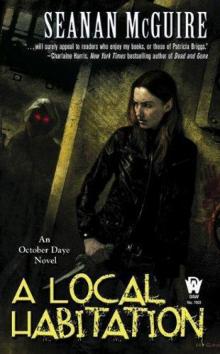 A Local Habitation
A Local Habitation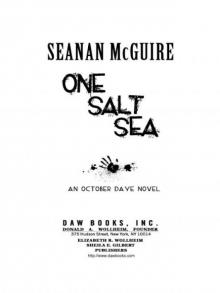 One Salt Sea
One Salt Sea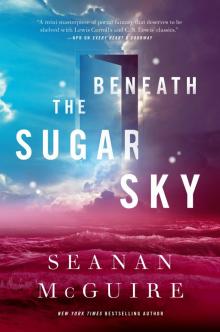 Beneath the Sugar Sky
Beneath the Sugar Sky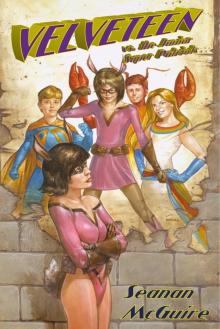 Velveteen vs. The Junior Super Patriots
Velveteen vs. The Junior Super Patriots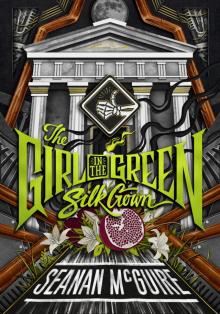 The Girl in the Green Silk Gown
The Girl in the Green Silk Gown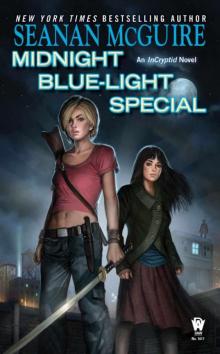 Midnight Blue-Light Special
Midnight Blue-Light Special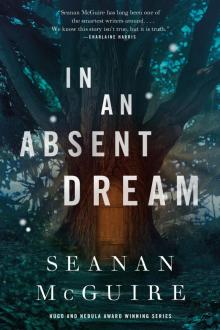 In an Absent Dream
In an Absent Dream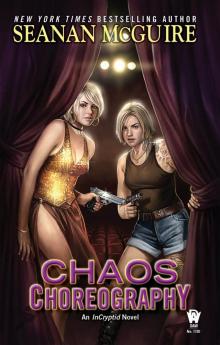 Chaos Choreography
Chaos Choreography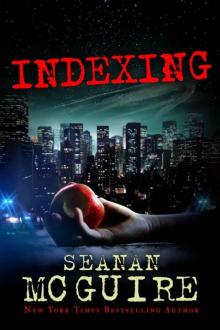 Indexing
Indexing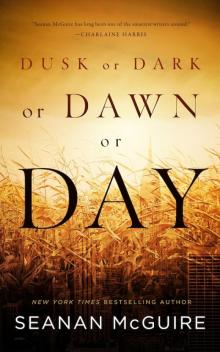 Dusk or Dark or Dawn or Day
Dusk or Dark or Dawn or Day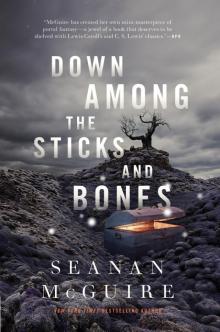 Down Among the Sticks and Bones
Down Among the Sticks and Bones The Razor's Edge
The Razor's Edge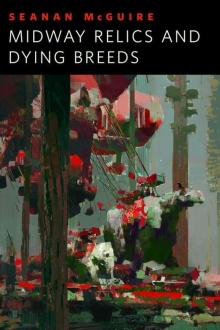 Midway Relics and Dying Breeds
Midway Relics and Dying Breeds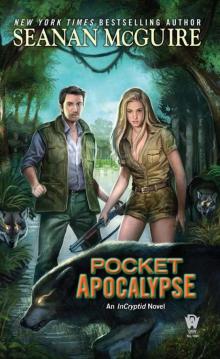 Pocket Apocalypse
Pocket Apocalypse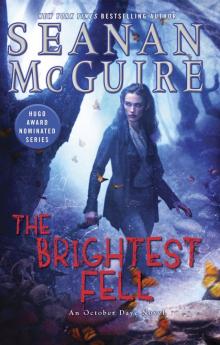 The Brightest Fell
The Brightest Fell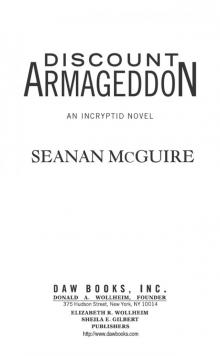 Discount Armageddon
Discount Armageddon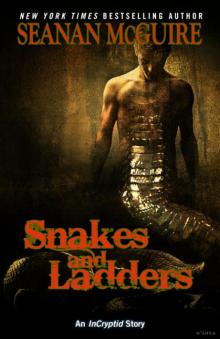 Snakes and Ladders
Snakes and Ladders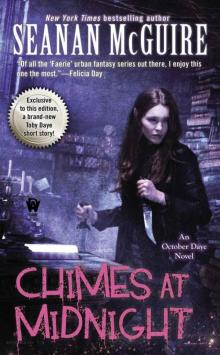 Chimes at Midnight
Chimes at Midnight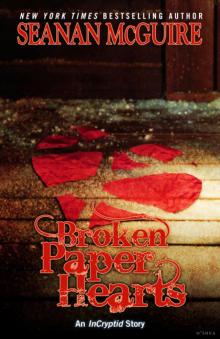 Broken Paper Hearts
Broken Paper Hearts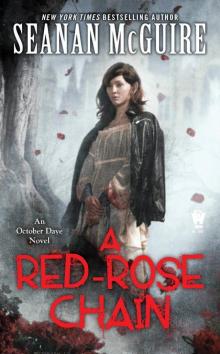 A Red-Rose Chain
A Red-Rose Chain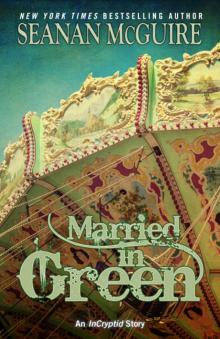 Married in Green
Married in Green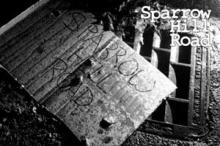 Sparrow Hill Road 2010 By Seanan
Sparrow Hill Road 2010 By Seanan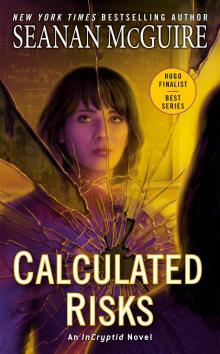 Calculated Risks
Calculated Risks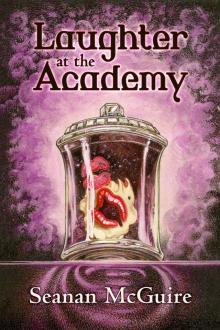 Laughter at the Academy
Laughter at the Academy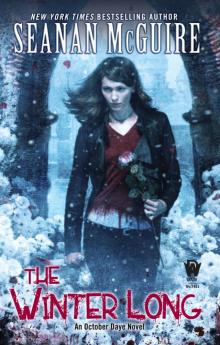 The Winter Long
The Winter Long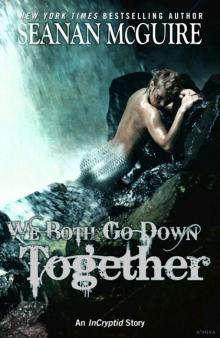 We Both Go Down Together
We Both Go Down Together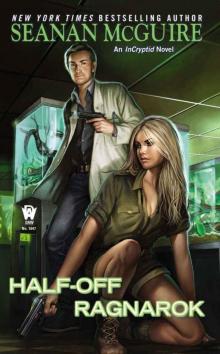 Half-Off Ragnarok
Half-Off Ragnarok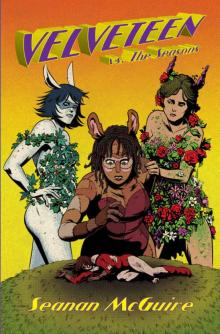 Velveteen vs. The Seasons
Velveteen vs. The Seasons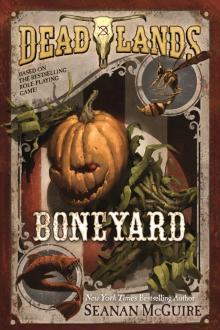 Boneyard
Boneyard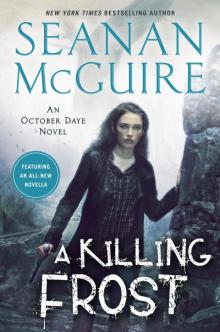 A Killing Frost
A Killing Frost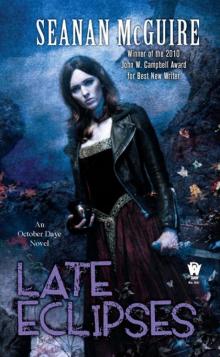 Late Eclipses
Late Eclipses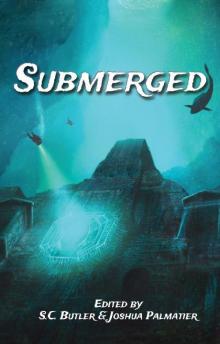 Submerged
Submerged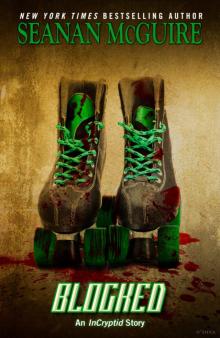 Blocked
Blocked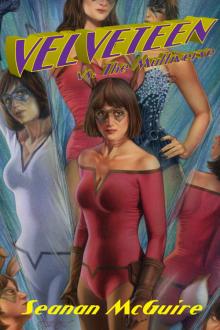 Velveteen vs. The Multiverse
Velveteen vs. The Multiverse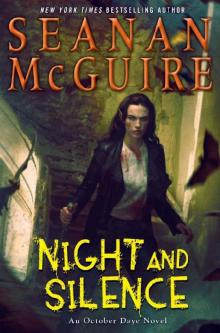 Night and Silence
Night and Silence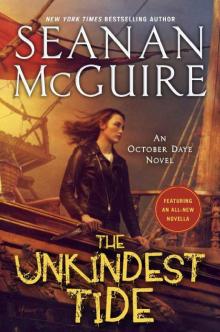 The Unkindest Tide (October Daye)
The Unkindest Tide (October Daye)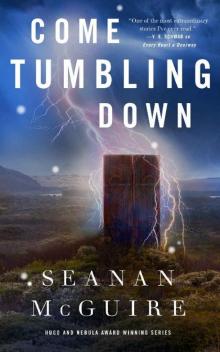 Come Tumbling Down (Wayward Children)
Come Tumbling Down (Wayward Children)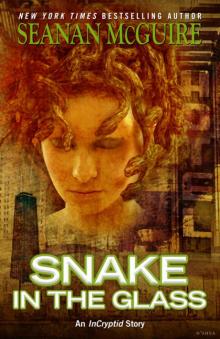 Snake in the Glass
Snake in the Glass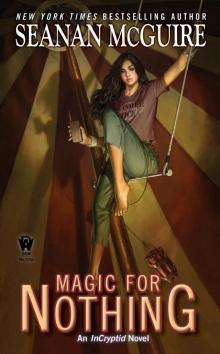 Magic for Nothing
Magic for Nothing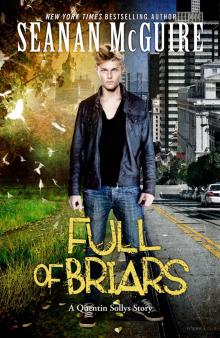 Full of Briars
Full of Briars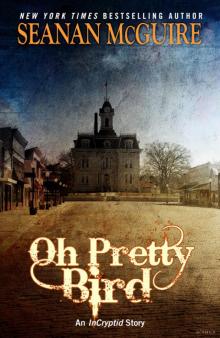 Oh Pretty Bird
Oh Pretty Bird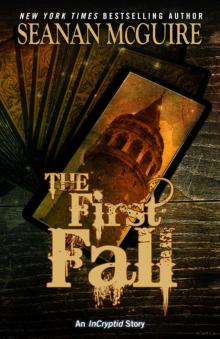 The First Fall
The First Fall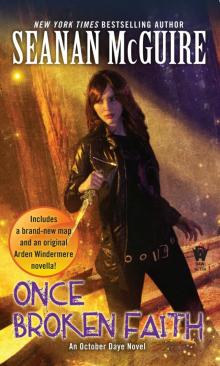 Once Broken Faith
Once Broken Faith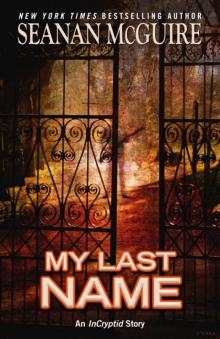 My Last Name
My Last Name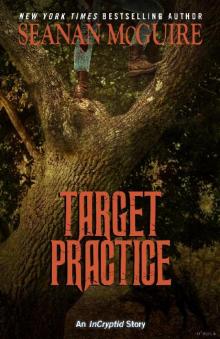 Target Practice
Target Practice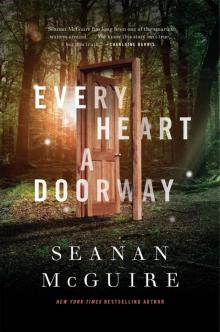 Wayward Children 01 - Every Heart a Doorway
Wayward Children 01 - Every Heart a Doorway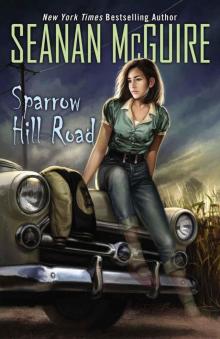 Sparrow Hill Road
Sparrow Hill Road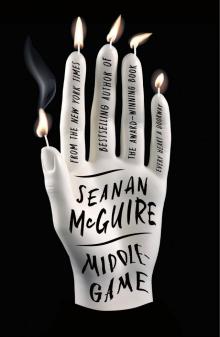 Middlegame
Middlegame Juice Like Wounds
Juice Like Wounds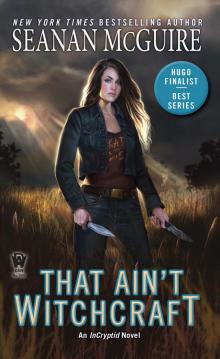 That Ain't Witchcraft
That Ain't Witchcraft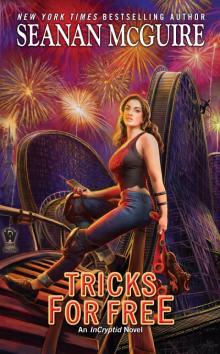 Tricks for Free
Tricks for Free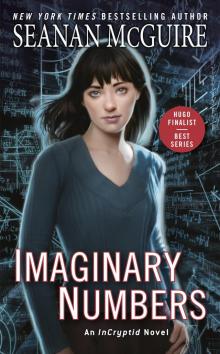 Imaginary Numbers
Imaginary Numbers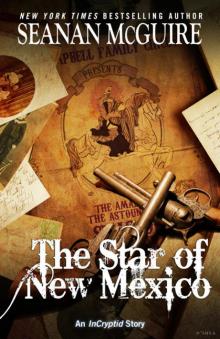 The Star of New Mexico
The Star of New Mexico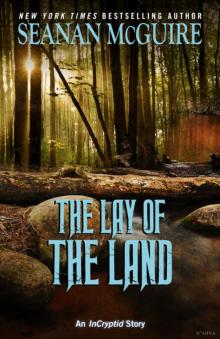 Lay of the Land
Lay of the Land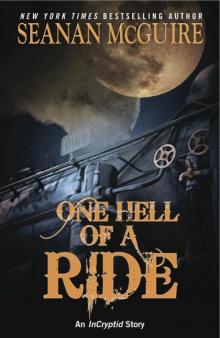 One Hell of a Ride
One Hell of a Ride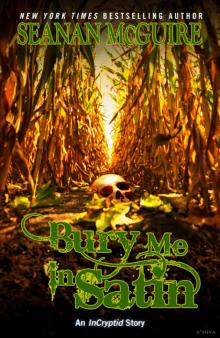 Bury Me in Satin
Bury Me in Satin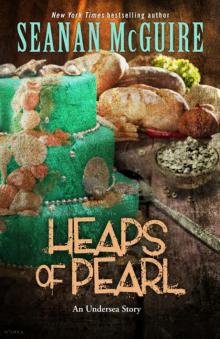 Heaps of Pearl
Heaps of Pearl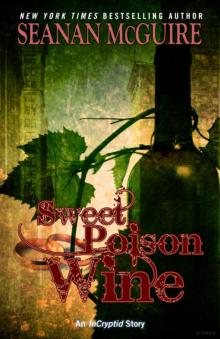 Sweet Poison Wine
Sweet Poison Wine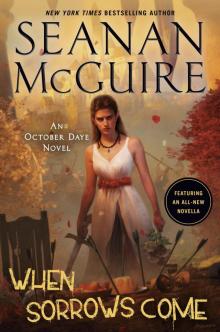 When Sorrows Come
When Sorrows Come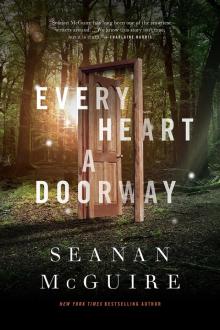 Every Heart a Doorway
Every Heart a Doorway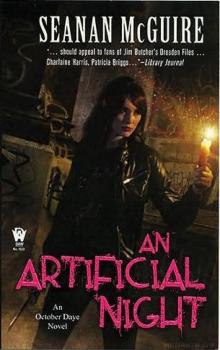 An Artificial Night - BK 3
An Artificial Night - BK 3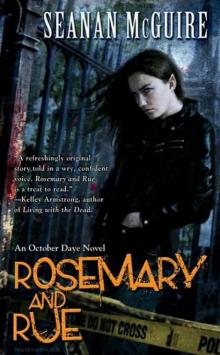 Rosemary and Rue
Rosemary and Rue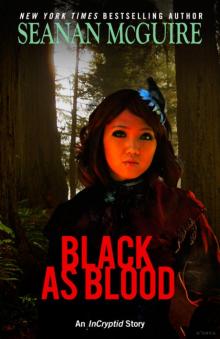 Black as Blood
Black as Blood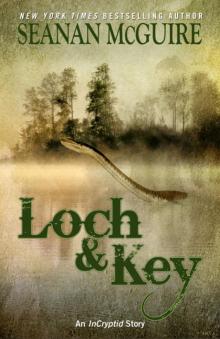 Loch and Key
Loch and Key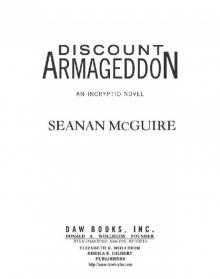 Discount Armageddon: An Incryptid Novel
Discount Armageddon: An Incryptid Novel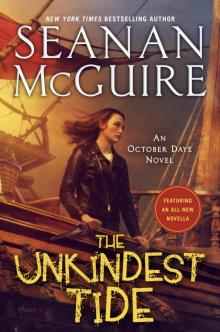 The Unkindest Tide
The Unkindest Tide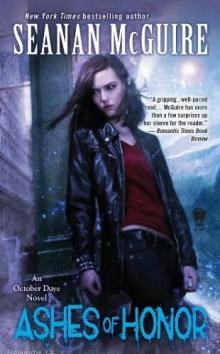 Ashes of Honor od-6
Ashes of Honor od-6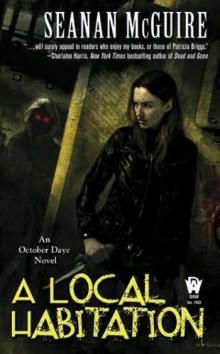 A Local Habitation od-2
A Local Habitation od-2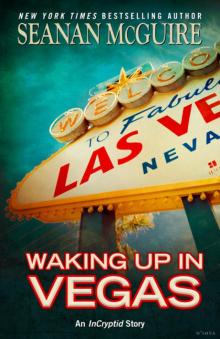 Waking Up in Vegas
Waking Up in Vegas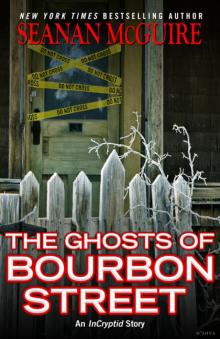 The Ghosts of Bourbon Street
The Ghosts of Bourbon Street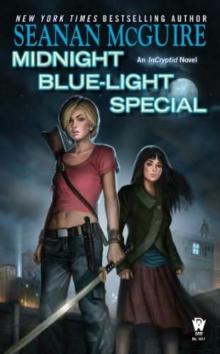 Midnight Blue-Light Special i-2
Midnight Blue-Light Special i-2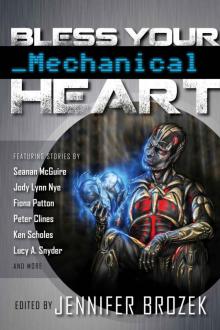 Bless Your Mechanical Heart
Bless Your Mechanical Heart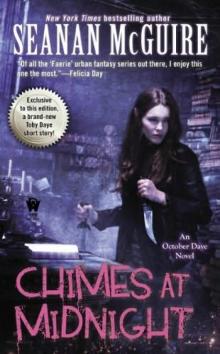 Chimes at Midnight od-7
Chimes at Midnight od-7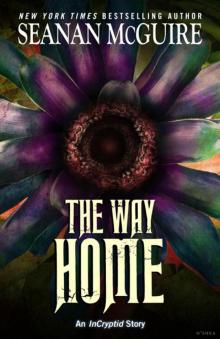 The Way Home
The Way Home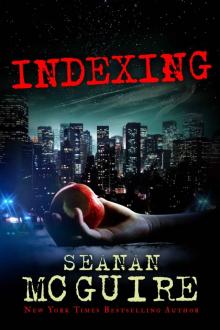 Indexing (Kindle Serial)
Indexing (Kindle Serial)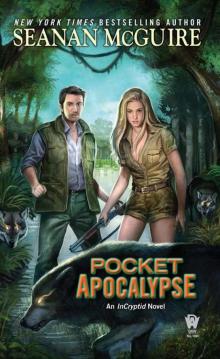 Pocket Apocalypse: InCryptid, Book Four
Pocket Apocalypse: InCryptid, Book Four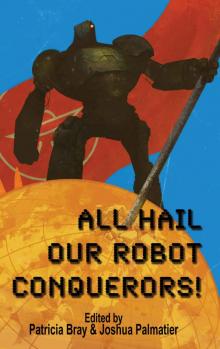 All Hail Our Robot Conquerors!
All Hail Our Robot Conquerors!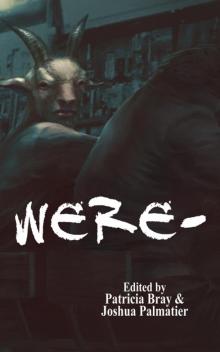 Were-
Were-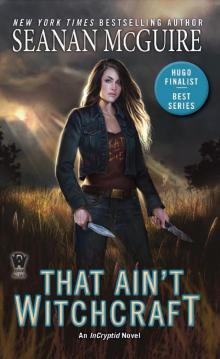 That Ain't Witchcraft (InCryptid #8)
That Ain't Witchcraft (InCryptid #8)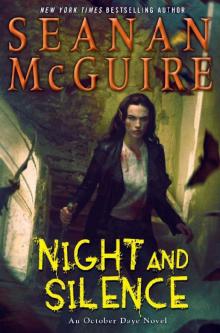 Night and Silence (October Daye)
Night and Silence (October Daye)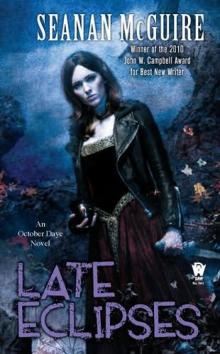 Late Eclipses od-4
Late Eclipses od-4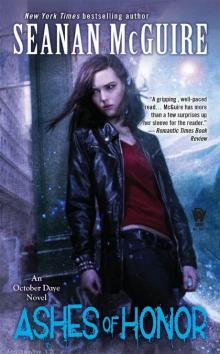 Ashes of Honor: An October Daye Novel
Ashes of Honor: An October Daye Novel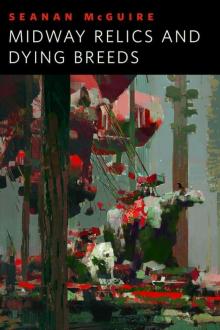 Midway Relics and Dying Breeds: A Tor.Com Original
Midway Relics and Dying Breeds: A Tor.Com Original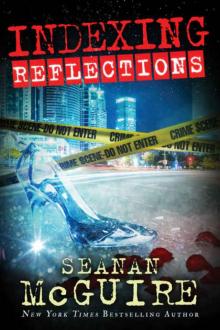 Indexing: Reflections (Kindle Serials) (Indexing Series Book 2)
Indexing: Reflections (Kindle Serials) (Indexing Series Book 2)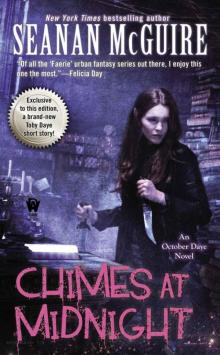 Chimes at Midnight: An October Daye Novel
Chimes at Midnight: An October Daye Novel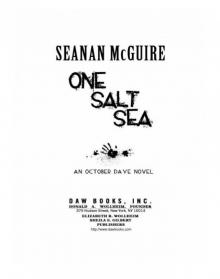 One Salt Sea: An October Daye Novel
One Salt Sea: An October Daye Novel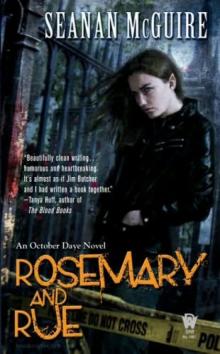 Rosemary and Rue od-1
Rosemary and Rue od-1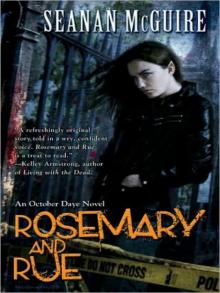 Rosemary and Rue: An October Daye Novel
Rosemary and Rue: An October Daye Novel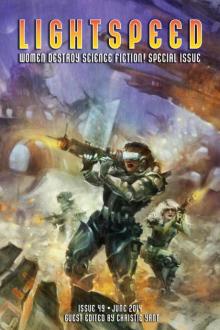 Lightspeed Magazine Issue 49
Lightspeed Magazine Issue 49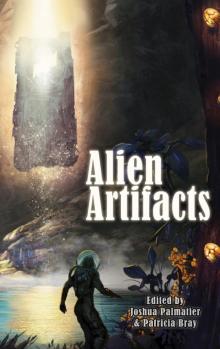 Alien Artifacts
Alien Artifacts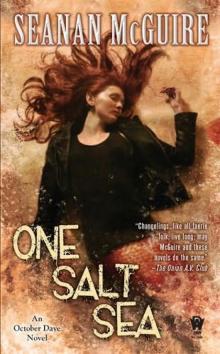 One Salt Sea od-5
One Salt Sea od-5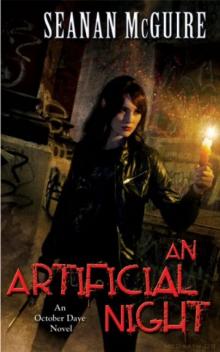 An Artificial Night od-3
An Artificial Night od-3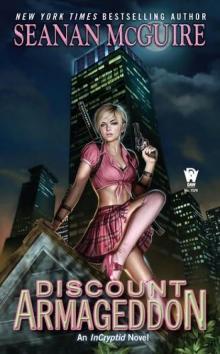 Discount Armageddon i-1
Discount Armageddon i-1